21 hobbies for women that will spark creativity and help you discover a new passion
Hobbies for women that will take you of your comfort zone to learn a fun new skill and often meet new people, too
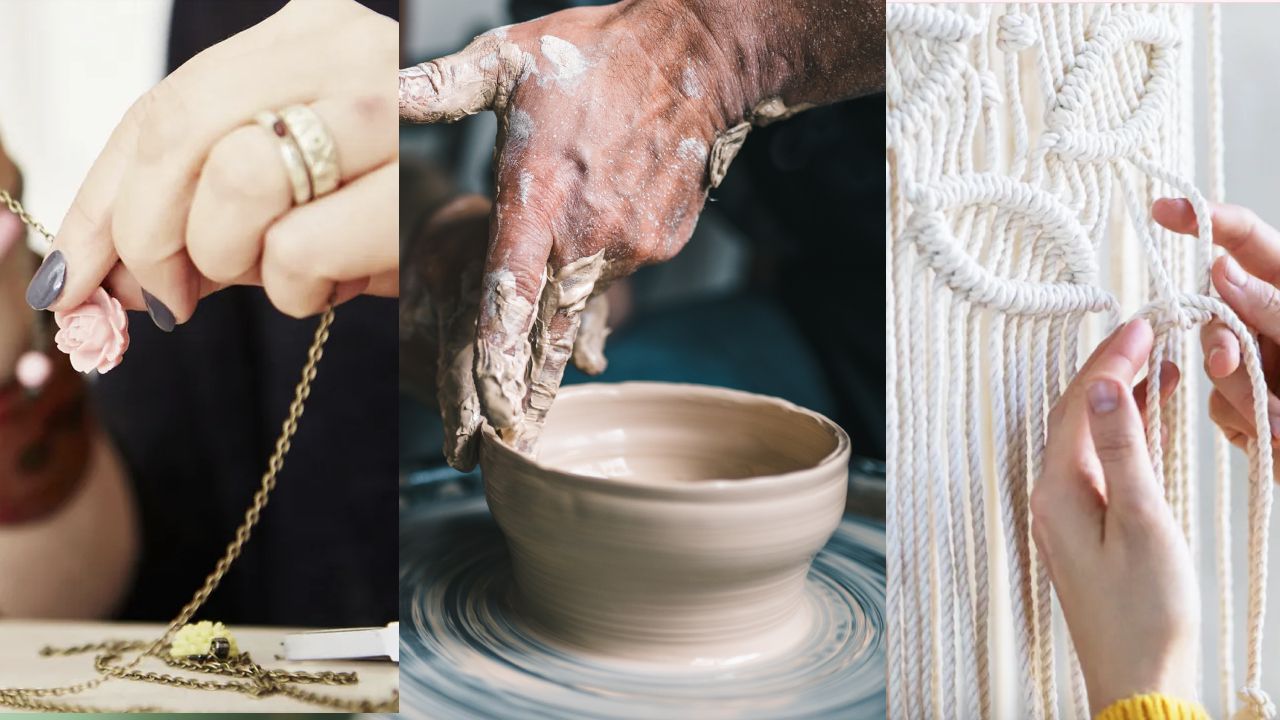
These hobbies for women will not only help you learn a new skill, but also could boost your health and wellbeing - not to mention help you meet some new people in the process.
Taking up a new hobby allows you to carve out some time for yourself while unplugging from things like work, family stress, and errands. As well as helping to relax your mind, hobbies can reconnect us to things we truly enjoy doing - they don't need to be productive or earn us money.
Many of these hobbies for women are inexpensive, too, with fun activities such as cold water swimming, yoga for beginners and fermenting requiring very little in terms of start-up costs. We’ve weighed up the most popular hobbies for women below including hobbies for couples, easy hobbies you can do at home, hobbies you can do in the kitchen, and the most relaxing hobbies to help you decide which is the right one for you. Let these ideas for hobbies inspire you to try something different and enrich your life.
Why are hobbies good for our health?

Hobbies can be a lifeline when it comes to dealing with stress. Family psychotherapist Jay Perkins of Partisan explains, “Hobbies are a way to detach ourselves from the anxieties of everyday life and can provide a valuable escape route for our minds. Even just half an hour spent engaging our minds on a hobby can have a positive impact on our mental health."
Research from the National Library of Medicine shows how hobbies stimulate the reward system in our brain and release hormones such as dopamine that motivate us to do the hobby again, as well as having more individual benefits. Playing a musical instrument, for example, is said to improve memory according to Dr Ciara McCabe, a professor of neuroscience, psychopharmacology and mental health. Dr McCabe also links reading and board games to preventing dementia in later life.
"People with hobbies are less likely to struggle with depression, stress, and low moods,” Poonam Dhuffer, a meditation practitioner, told us. According to Dhuffer, hobbies are a great way to practice mindfulness too, who told us, “Crafting, for example, can calm our nervous systems, as we’re using our hands and brains together, being fully aware of where we are and conscious of what we’re doing."

Jay Perkins is founder and chief executive officer at Partisan. He is a qualified child, adolescent and family psychodynamic psychotherapist and EMDR therapist. He specialises in creating alternative help systems that centre marginalised and racialised communities.

Professor Ciara McCabe examines the human reward experience using behavioural techniques and brain imaging. She is a lecturer in cognition, learning and neuroscience, as well a MSc and BSc project supervisor.

Poonam Dhuffer is a somatic coach, meditation practitioner and creative facilitator at YSM8, which aims to help members of the community unlock their inner wisdom through meditative practices.
The best hobbies for women
Fitness
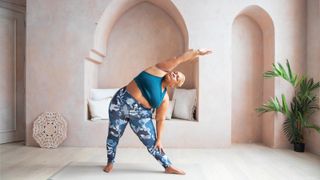
1. Practice yoga
Start up costs: ££ | Start up kit: Yoga mat, blocks and online classes | Indoor or outdoor: Both | Group activity: Optional | Skill level: Class dependent
Sign up for the woman&home newsletter
Sign up to our free daily email for the latest royal and entertainment news, interesting opinion, expert advice on styling and beauty trends, and no-nonsense guides to the health and wellness questions you want answered.
Yoga is about so much more than simply rolling out your best yoga mat and honing your technique - it’s a whole lifestyle and the more you learn about yoga and its ancient principles, the more it will benefit you off the mat.
“Yoga isn't just about the postures themselves, the practice takes us on a journey of self-discovery,” Lauren Brady, yoga teacher and founder of Lauren Brady Yoga told w&h. "Firstly connecting us to our bodies and breath, and then taking us deeper. We learn to see ourselves more clearly on and off the mat, to witness our thoughts and reactions, and ultimately it guides us to see that we are part of something greater than ourselves, connecting us to our spirituality.”
Yoga is one of the most popular exercise forms in the world, as well as being one of the most popular hobbies for women. Last year the Yoga Alliance reported that around 36 million people were regularly practicing yoga in America alone and 56% of those were classed as beginners. With so many tutorials online, yoga is a hobby that you can get started with very easily. The benefits of yoga are clear; not only will you feel stronger and fitter, but yoga can also help reduce stress, increase happiness and improve memory function.

Lauren Brady is qualified yoga teacher who offers a range of techniques, from flowing vinyasa to the calmer more inwardly focused yin yoga.
Reasons for:
- Will improve fitness levels
- Boosts mental wellbeing
- Increased flexibility
- Teaches valuable life lessons
Reasons against:
- Can be difficult to master at first
- Classes can be expensive
All you need to begin practicing yoga is a mat, which you can use in the house or garden, and some workout clothes. Comfort is key, so make sure you choose activewear that fits well and feels great. If sore joints are an issue, you could try one of the best thick yoga mats, too.

2. Nordic Walking
Start up costs: £££ | Start up kit: Walking poles, walking shoes | Indoor or outdoor: Outdoor | Group activity: Optional | Skill level: Medium
Reasons for:
- Will improve fitness and muscle strength
- Aids weight loss
- Promotes eco-therapy
- Great way to explore surroundings
Reasons against:
- Can be expensive
Nordic Walking uses poles that propel you forward. This means you engage your upper body more than when rambling or trekking. It’s also great for those with joint problems, as the poles mean you’re applying less pressure when walking. “Public Health England and the Centre for Aging Better recently said it’s one of the best activities for strengthening muscles and balance,” Dr Melanie Wynne-Jones told w&h. “Which is essential, as this tends to deteriorate as we age, making us more prone to falls.”
It's no secret that walking in nature is good for body and soul, with the benefits of forest bathing earning it a huge following across the world. Whether you live near the ocean, or forest or want to take in the sights of your hometown, walking gives us space to think, gets our joints moving, and allows us to breathe in some fresh air. Nordic walking poles cost around £30 and you will also need a good pair of walking shoes (check out our guide to the best women's walking shoes if you're in the market for a new pair). Then it's worth getting in touch with a Nordic Walking instructor to find out about walking routes near you. This is also a great hobby for couples if you want to start with a companion. You can find out more at Nordic Walking UK.
3. Wild swimming

Start up costs: ££ | Start up kit: Swimming costume, (optional) wetsuit, swim boots, swim gloves, wooly hat | Indoor or outdoor: Outdoor | Group activity: Optional | Skill level: Medium
Wild swimming - also called open-water swimming - has been rising in popularity for a few years now, making it one of the best new hobbies to try if you're looking to take up something physical, invigorating - and maybe a little out of your comfort zone. There are plenty of health benefits of cold-water swimming, including an instant mood boost, increased fitness levels and better circulation. Cold water swimming also makes it on our list of the best hobbies for women in their 30s though it really is all-ages.
Matt Ovenden, on-the-water expert at Borrow A Boat, says, “The thrill and exhilaration that comes with wild swimming has meant it’s fast become a national pastime. Far from just a way to exercise, wild swimming comes with a plethora of mental and physical health benefits, from the cold water helping to boost your immune system to the release of endorphins giving you a natural high."
Reasons for:
- Good for both your mental and physical health
- Gets you outside
- Can be a social activity
Reasons against:
- It can be uncomfortable to begin with
- Not advised for those who aren't strong swimmers
To get started, invest in a good-quality swimsuit and potentially a wetsuit. You'll also need to purchase some neoprene swim gloves and boots if swimming in colder temperatures (some wild swimmers also prefer to wear aqua shoes while wild swimming to protect their feet from any potentially rocky ground) and complete an induction at your local pond, lake or by the sea depending on where you want to wild swim. There are additional health benefits to swimming in the sea thanks to its high salt content, but some may prefer a secluded and still lake to get their ecotherapy fix. For guidance, take a read through the Outdoor Swimming Society Swim Responsibility Statement and always chat about safety considerations with a lifeguard beforehand.
“The beauty of wild swimming is that it’s a simple, low-cost hobby that anyone, regardless of age, gender, background, can enjoy with opportunities to enjoy it wherever you live," Ovenden explained. If you don't feel confident heading out on your own, there are plenty of groups to join where you can wild swim with others in tow. The Outdoor Swimming Society's website has an extensive list of local groups to join.
4. Dancing

Start up costs: £ | Start up kit: Just bring yourself and maybe a good pair of trainers | Indoor or outdoor: Indoor | Group activity: Optional | Skill level: Easy
Reasons for:
- It's great for fitness
- It's a lot of fun
- Can be a great way to socialize
- Can be as inexpensive as you like
Reasons against:
- You may feel self-conscious at first, but the most important thing is to have fun!
Dancing is arguably one of the most fun hobbies to pick up, and it's fantastic for upping your fitness levels too. According to the NHS, it's brilliant for weight loss, as well as improving your posture and your bone and muscle strength. Not only is dancing good for your body, but it's also a great way to improve your mental health, it releases endorphins which can make you feel relaxed and happy.
If you're keen to take up dancing as a hobby, there's also nothing stopping you from getting started right now. If you'd rather learn to dance in a more professional setting though, there are always local dance groups running. Plus, learning to dance with others is a great way to socialize, and have fun at the same time.
You can try your hand at any form of dancing, be it modern dance, classical dance such as ballet, or professional dance numbers such as the foxtrot and the tango. Lessons vary in price, especially if you opt for pricier one-on-one sessions as opposed to group classes. But you can make a start yourself right away (and for free). Simply put on your favourite upbeat song and go for it!
Crafting
5. Learn the art of ceramics
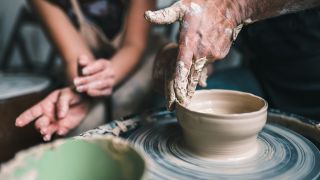
Start up costs: £££ | Start up kit: Ceramics course (will include materials) | Indoor or outdoor: Indoor | Group activity: Potentially | Skill level: Medium
Reasons for
- Medative and relaxing
- Allows you to learn a valuable skill
- Finished products make great additions to the home or gifts
Reasons against
- Can seem difficult at first
- Expensive
Thanks to numerous ceramics courses across the country, ceramic making can be a hobby for the masses, with classes to suit all abilities on offer. This is one you generally can't do at home, as you'll need to use a kiln to transform your pieces from clay to ceramics, but creating beautiful pieces of crockery, vases and ornaments isn't as intimidating as it may sound under the guidance of a professional. Who else is ready for their own Ghost moment?
For Hayley Johnson, a PR Director from London, ceramics classes have provided a much-needed respite from the digital world. "I've always loved interiors so ceramics is a wonderful creative outlet for that," she told w&h. "Beyond that, it's also a great ritual of self-care. Like most people, I spend way too much time glued to a screen, so it's a great way to have a complete digital detox. In fact, pottery is so messy that I can't even wear my smartwatch, so for a few hours I'm completely free from notifications popping up.
"Pottery also teaches me to slow down. In the day-to-day, I always feel like I'm rushing around and am non-stop, but throwing on the wheel requires a lot of patience. One rushed action and you can ruin a whole pot, so you have to learn to slow down and concentrate, really be in the moment and present. It's like a form of meditation."
6. Try your hand at jewelry making

Start up costs: ££ | Start up kit: A jewelry making kit | Indoor or outdoor: Indoor | Group activity: No | Skill level: Medium
Reasons for:
- You're left with a unique finished product
- Can generate great gifts
- Encourages mindfulness
- Provides a creative outlet
Reasons against:
- Can be expensive
- Patience is a must
- Labour intensive
The best jewellery-making kits will include everything you need to take up this rewarding hobby, including any necessary tools and detailed instructions. Kits usually come with wire, string, needles, hooks, lobster claws, and clasps. And if you’re still not sure, there are so many online jewelry-making classes that will help you perfect your craft - t's never been easier to learn how to make jewelry at home.
Crafting your own jewellery has long been considered a therapeutic creative outlet - it’s time-consuming but produces a beautiful result. You could start with something really simple, such as learning how to make a bead bracelet and then work your way up to intricate, one-of-a-kind statement pieces. Learning how to make earrings is also a good first step, as a simple style can still look really effective.
Jewellery-making is one of the most popular hobbies for women. Make unique pieces to update your look, or create homemade gifts for loved ones. Before you know it you could have a covetable collection, whether you want to set up a store on Etsy or keep your creations for yourself.

7. Embroidery, tapestry or knitting
Start up costs: £ | Start up kit: Knitting/embro needles, fabric and thread or yarn | Indoor or outdoor: Indoor | Group activity: No | Skill level: Difficult at first!
Reasons for:
- Mindful activity
- Beautiful finished product
- Will leave you feeling accomplished
- Great new skill to learn
Reasons against:
- Can be difficult to master
- Time-consuming
- Can be expensive
Taking up embroidery, knitting or tapestry can be as simple or complicated as you like. If you want to try basic embroidery, all you need is some fabric (like cotton or calico), an embroidery hoop, embroidery needles, and thread. You can order all you need online from a craft store such as Hobbycraft - just look for the section on basic stitches.
If you want to hone your craft further, you could teach yourself how to stitch with one of the best sewing machines via online tutorials, to create beautiful textiles at a quicker pace (our guide on easy sewing machine projects is also a great place to start!) This being said, there's something to be said for the slow and mindful pace of embroidering or knitting, methodically working towards a finished product. It's meticulous work, but deeply satisfying when you're left with the finished item.
You might like to start with embroidering a name, a simple pattern, or a floral design. To begin, simply draw on your cloth with a pencil and stitch on top - adding buttons and sequins is an easy win. And if you’re a confident artist, try recreating a portrait in stitch. There are plenty of online tutorials to get you started, like this video that walks you through seven basic embroidery stitches, or this knitting video that will teach you the basics. It's one of the easier hobbies for women to pick up without much prep at all.
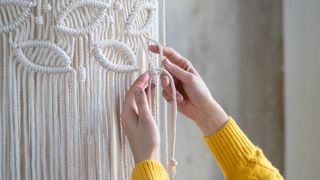
8. Learn how to make Macrame
Start up costs: ££ | Start up kit: String or cord, online tutorial | Indoor or outdoor: Indoor | Group activity: No | Skill level: Difficult at first!
Reasons for:
- So in vogue right now
- Suitable for a range of abilities
- Beautiful finished product
Reasons against:
- Time consuming
- Fiddly with plenty of room for error
Macrame was all the rage in the '70s. Now - along with houseplants - it’s back in vogue. Making a macrame plant pot holder is one of the easiest ways to try out this skill and you can then move on to more advanced patterns. It’s a low-cost hobby, too. All you need is string/cord and a little patience and pot holders make lovely gifts, making it one of the more lucrative hobbies for women.
There are good things and bad things about taking up macrame and if you're not one who possesses much patience, then it's probably not for you, as this is one hobby that takes a little time to develop the skill. However, once you master it, it's a great creative skill to have as you can make a whole range of beautiful products. You can make home accessories like placemats and coats, make a lovely light spring jumper or you could even pair it with some feathers and come up with a magical dream catcher.
9. Take up candle-making

Start up costs: ££ | Start up kit: Wax, a jar, a wick, and other household essentials- or, you can buy ready-made kits | Indoor or outdoor: Indoor | Group activity: It can be! | Skill level: Medium
You might not have considered it as a hobby, but let's face it - some of the best-scented candles can be pretty pricey, so making your own is a great way to create some really unique candles that won't cost you the earth either. Candle-making is a brilliant way to get creative, plus it's one of our favourite hobbies to do at home when we want to relax and unwind.
We've got a full guide on how to make candles at home, but the very first things to consider when making a candle are the wax you will use, the container, the wick, and the fragrance or essential oils you want to create the scent of your candle.
Reasons for:
- Calming and meditative
- Leaves you with a lovely end product
- Relatively low-cost to get started
- Can make for great DIY Christmas or birthday gifts
Reasons against:
- Cost of this hobby can add up over time
- Not ideal for those who have children around often, given the hot wax
When it comes to actually creating your candle, the process is actually relatively easy. Put simply, it involves melting your wax and fragrance oils in a pan, inserting the wick, and leaving the candle to cool for at least 24 hours at room temperature.
Not only will taking up candle-making as a hobby leave you with a gorgeous end product you can enjoy almost instantly, but it can also be really meditative and relaxing, as you work your way slowly through the process to create something tangible. Plus, it won't cost you loads to get started, and it's something you could enjoy with others too - why not try it out as an alternative date night idea with your partner?
Cooking

10. Have a go at fermenting
Start up costs: £ | Start up kit: A fermenting starter pack, jam jars, veg | Indoor or outdoor: Indoor | Group activity: Optional | Skill level: Medium
Reasons for:
- The finished product is tasty and edible
- Health-boosting
- Can be as time-consuming as you like
Reasons against:
- A little messy
- An unsightly scoby is not for the squeamish
Gut health has placed itself firmly at the forefront of our health agenda, with the benefits of eating fermented foods obvious, from clearer skin to better organ function, as well as having a significant impact on our mental health. They don’t call the gut the ‘second brain’ - a term coined by medical experts to explain the importance of what's happening in our guts - for nothing. Thanks to our newfound respect for gut-loving foods, fermentation has become a popular hobby, with many heading to the kitchen to cook up kefir, miso paste, sauerkraut, kimchi, and kombucha.
Kombucha in particular is having a health-food moment, with sales skyrocketing in recent years. “At LoBros we sold more than 2 million bottles in 2020, with online sales growing 127%,” Natalie Stanton, head of sales at Soulfresh UK told w&h. “Brewing your own kombucha has also seen a resurgence, with sites like Happy Kombucha selling everything you need for a homebrew kit. It’s a fun hobby with a delicious outcome.” Kombucha is easy to brew at home if you have the correct tools; sugar, tea, and a living bacteria culture called a scoby.
Fermented foods such as sauerkraut and kimchi are also easy enough to whizz up in a blender or food processor. To rustle up some kimchi, all you need is a diced crunchy vegetable, salt, and a jar with a well-fitting lid so it's a great one to start with. Dr Clare Bailey, the wife of Dr Michael Mosley, who is famous for his No Sugar Diet, is a big fan of fermented food kimchi. She has incorporated it into their Fast 800 intermittent fasting plan and the couple praise gut-friendly foods as a whole in their book, The Clever Guts Diet. If you want a hobby that will boost your health from the inside, it looks like fermenting is the way to go.
11. Build up your recipe collection
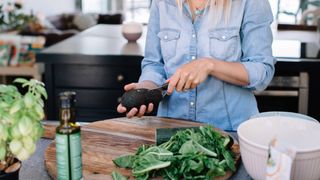
Start up costs: £ | Start up kit: Ingredients and kitchen utensils | Indoor or outdoor: Indoor | Group activity: Optional | Skill level: Easy
Reasons for:
- A skill that will come in useful time and time again
- The opportunities are endless
- The results are edible (and hopefully delicious!)
Reasons against:
- It can take time to get it right
- Potentially hazardous
Trying out the best recipe boxes can be a great way to experiment in the kitchen, with top chefs and foodie brands sharing their insider secrets when it comes to rustling up tasty dishes. Before you know it, your culinary skills have much improved thanks to the nifty tips and tricks picked up along the way, all while following fool-proof recipe cards. Cooking isn't only a wonderful treat for your friends and family, it has the ability to quiet our minds and encourage us to concentrate on the task at hand. For many it's therapeutic.
Baking is far more precise by nature, perhaps one for the scientists and mathematicians among us, while cooking allows you to bend the rules. When planning new recipes, it could be interesting to try cooking a cuisine that is new to you, such as vegan food. We love this BOSH! Green shakshuka for a tasty vegan brunch, as well as classic collections like our one-pot dinner recipes if you want to start with the basics.
It can be deeply satisfying to store your recipes on beautiful recipe cards; a joy for all the stationary fans out there. Or, simply jot recipes down in a notebook, or save them within your bookmarks online. However you store them, you'll be thankful you built up your repertoire come future dinner parties.
12. Get into baking

Start up costs: ££ | Start up kit: A mixer, mixing bowl, whisk, rolling pin and a baking tin | Indoor or outdoor: Indoor | Group activity: Optional | Skill level: Medium
Reasons for:
- Homebaked goods always taste better!
- Can be relaxing and meditative
- Results are delicious
Reasons against:
- Can take time to build up your skills
- Can be expensive, when you factor in the different ingredients you'll need
- It can take time and patience
Baking is a popular hobby for good reason - it can be incredibly soothing to absorb yourself in the process, and - of course - it can yield some very delicious results!
Getting started does require a few kitchen essentials though; your baking journey will be a lot easier if you have one of the best stand mixers (or one of the best KitchenAid stand mixers) to hand, as well as the necessary tools, such as a mixing bowl, a whisk, and a rolling pin. Of course, you'll also need some great baking books to hand - Mary Berry's and Yotam Ottolenghi's are particularly popular. You'll also need to purchase the ingredients each time, of course.
But it's well worth the time and effort you put into getting set up. Baking takes real skill, with different methods needed for different types of bakes - and perfecting that can feel like a real achievement. Plus, all of your family and friends will (and you), will get to enjoy the spoils of your efforts, and baked goods can make for fantastic gifts for birthdays or Christmas.
13. Try your hand at mixology

Start up costs: ££ | Start up kit: Ingredients, glasses and bar utensils | Indoor or outdoor: Both | Group activity: Optional | Skill level: Easy
Reasons for:
- A skill that will come in useful and impress your guests
- You can learn to make what enjoy drinking
- It's a fun activity
- The results are delicious
Reasons against:
- It can be messy
- Ingredients and kit can become expensive
Who needs to head to an expensive bar for cocktails when you've got your very own mixology expert at home? As opposed to how it may seem when you glance over at your bartender pouring and mixing behind the bar, cocktail making isn't as simple as chucking a few ingredients in a shaker and hoping for the best. Of course, that is a tactic many of us have tried after a few tipples - and it hasn't always turned out badly...But if you want to recreate your all-time favourites at home, then there is an art to it - and it can be one of the most fun hobbies for women.
To get started, you'll need to invest in a cocktail shaker kit. These come in all shapes and sizes and at a variety of price points depending on where you buy them from, how many pieces are included and what material you choose - they generally come in stainless steel but there are a few fancy gold or copper ones around. Make sure your set includes at least: a shaker, a jigger (or measure), a strainer, a spoon and a pestle (or tamper). A corkscrew and pourers can also be helpful depending on what type of cocktails you plan on making, what tools you already have at home and if you want to make an impression on your guests with a spirit-pouring display. Some also come with ice tongs that are a cool but somewhat unnecessary addition. If you plan on making frozen cocktails, it also helps to have one of the best blenders on hand.
After you're stocked up on tools, ingredients are the next must. It's helpful to have the basics in - mainstream spirits like vodka, gin, rum, whiskey and tequila. Citruses are also helpful to have on hand as well as essentials like sugar and salt. Next think about liqueurs and flavourings like Angostura bitters, syrups, triple sec, amaretto and any other bits that you usually like in your drinks. And of course, mixers like juices, soda water and ginger ale come in handy. We'd suggest getting hold of a cocktail-making book or scouring the net and making a list of your favourite cocktail recipes. The last thing to think about - glassware. Obviously, you can serve your cocktails in any old glass, but it really does add something to the experience to have the right glassware for each drink. Build up a collection of coupes, tumblers, hiballs and of course, a trusty martini glass.
Hortology
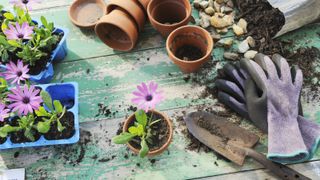
14. Get into gardening
Start up costs: £ | Start up kit: Seeds, bulbs and tools | Indoor or outdoor: Outdoor | Group activity: Potentially | Skill level: Easy
Reasons for:
- You'll enjoy the end result time after time
- Will help you spend more time outside
- Stress-busting
- Can help you save money by growing your own fruit, veg and herbs
Reasons against:
- Results aren't instant
- Can be weather dependent
Gardening, perhaps one of our favourite hobbies for women, comes with a huge list of benefits, both physical and mental. Planting bulbs, pulling weeds, and tending to an allotment offer the perfect antidote to a day spent glued to a screen indoors, and can even alleviate depression and ease anxiety. With plenty of places to buy plants online, getting everything you need to try out this hobby couldn't be easier. Head to your local DIY or garden shop to pick up the essentials or shop online, either with your local garden centre, or a retailer like Amazon.
If you're new to gardening, a good place to start would be with a small herb garden or wildflower garden. You will need a garden rake to clear the space of stones and debris, some canes to lay on the earth to make sure the seed is spreading evenly, and some herb or wildflower seeds. A particularly joyful pastime is planting sunflowers with the family, competing over whose climbs the highest come the summer months.

15. Learn the art of flower arranging
Start up costs: ££ | Start up kit: Blooms of choice, a vase, trimmer | Indoor or outdoor: Indoor | Group activity: No | Skill level: Medium
Reasons for:
- Very creative
- Will brighten up interiors
- Good for beginners
Reasons against:
- We can't think of any!
One of the best hobbies for women if you love flowers! This is a relaxing and creative way to spend an hour or two, with a beautiful finished product that will enhance your living spaces. What makes this hobby so popular is how accessible it is - anyone can have a go and the finished result is unlikely to be anything but beautiful. Plus, whether you opt to pick wildflowers from the garden, or pick up some affordable blooms in your local grocery store, everything you need is readily available.
Long gone are the days when flower arranging meant sticking to traditional arrangements, with much more scope for creativity. A quick scout around on Pinterest or Instagram should give you all the inspiration you need to try flower arranging, but if you want something more prescriptive, there are plenty of in-depth tutorials online to help you learn the basics before you find your own flair like this flower arranging step-by-step guide from Celebrity Florist Carly Cylinder.
Art, writing, and photography

16. Up your photography game
Start up costs: £££ | Start up kit: Camera, optional editing softwear | Indoor or outdoor: Both | Group activity: No | Skill level: All levels
Reasons for:
- A skill you can use anywhere
- Creative, and encourages mindfulness
- Documents significant moments
Reasons against:
- Equipment can be expensive
- Editing can be time-consuming
Photography is one of the best hobbies for women because if you want to start with the basics, you don't need to buy anything extra. Sure, you could splash out hundreds - even thousands - on an expensive camera, but thanks to the latest smartphones, every woman and her iPhone has the potential to be a great photographer.
Whether you're amassing an enviable Instagram-ready photo album or looking to get published in a magazine, photography offers the opportunity to capture memories, improve your eye for detail and relieve anxiety, as you spend much of your time focusing on your surroundings and living in the moment.
While anyone can take a picture, it takes a certain finesse and the right techniques to really capture the right angles. Take a photography course online before you get started and make sure you read up on which camera is best for you. A DSLR camera, for example, is ideal for a beginner - easy to use and starting price points are accessible.

17. Experiment with photo collage
Start up costs: £ | Start up kit: Photographs, craft materials | Indoor or outdoor: Outdoor | Group activity: No | Skill level: Easy
Reasons for:
- A fun way to store your memories
- Inexpensive
- Collages make great gifts
Reasons against:
- Can be messy
- Time-consuming
Is there anything more joyful than looking through old photograph albums, and recalling happy pastimes? The more candid the shots the better, if you ask us. And after you've brushed up on your photography skills, why not learn how to showcase your photographs in a unique and beautiful way?
This goes the same for old (particularly black and white!) photographs too. Dig out those old albums that have been gathering dust in a cupboard somewhere for years and bring the memories back to life with some crafty presentation. Collages can be displayed in your home in frames in meaningful shapes or patterns such as a map or a heart, or strung up with string or wire to make personalized bunting.
If you favour the vintage look, reprint old photographs onto Polaroids for a retro starting point. And, on that note, if you don't own an expensive digital camera, there's something wonderfully nostalgic about snapshots captured with a good old-fashioned disposable camera, which you can pick up for around £5 online.
18. Commit to journaling

Start up costs: £ | Start up kit: A notebook and a pen | Indoor or outdoor: Indoor | Group activity: No | Skill level: Easy
Journaling may not strictly be a hobby, but it can be a really enjoyable and beneficial activity to do on a daily basis if you're after a bit of mental clarity. It can take any kind of form you want - whether you prefer to write in response to prompts (e.g. what am I grateful for today?), or prefer writing a stream of consciousness about your feelings, worries, or hopes. You could take a look at the best goal planners for inspiration.
There are different ways to lay out your journal entries too - some people like to use the bullet journal format, where you table off your thoughts and plans (one section could be for goals, one section could be for reflections, for example), while others just write and write, either in bullet point format or just in paragraphs. It's one of the best hobbies for women if you want to express yourself creatively.
Reasons for:
- Can help with mental health issues such as stress and anxiety
- It's almost free
- Easy to get started with
- Can be useful for planning your to-do lists too
Reasons against:
- Can be difficult to stay consistent with writing every day, if that's your goal
The key is finding out whatever works best for you because journaling can provide enormous benefits whichever way you do it. It can help you to offload and deal with any negative emotions, it can be a good way to practice positive self-talk, and it can simply help you to get rid of a lot of mental clutter that may be circulating in your mind. Many have found that it helps to reduce anxiety and stress, and it can help to identify patterns in your mood too. -for example, it can help you realize how much a day without any time to yourself can impact you.
And best of all, you need almost nothing to get started. There are specific journals you can buy for different purposes (such as wellbeing journals), but all you really need is a blank notebook and a pen. Happy journaling!
19. Take a creative writing course

Start up costs: Varies | Start up kit: Writing materials/computer, creative writing course (optional) | Indoor or outdoor: Indoor | Group activity: No (unless joining an in-person group) | Skill level: Medium
Reasons for
- Mentally stimulating
- Could lead to further opportunities
- Can be very low cost
- A chance to meet likeminded people
Reasons against
- A lot of self-motivation required
- Sharing personal work can feel intimidating in a group setting
Always fancied yourself a novelist? If you have some time to spare it could be the perfect time to invest it trying your hand at creative writing - and who knows where it could lead. The beauty of this hobby is that you can do it from anywhere and don't necessarily have to encounter any start-up costs or admin - the only integral thing you need is your imagination.
For those who do feel they benefit from a more strict routine, there are affordable courses you can opt for online, often hosted by bestselling authors to provide invaluable insights. Writer Lauren Hughes tried out Curtis Brown's online course Writing A Psychological Thriller Course led by journalist and novelist Erin Kelly (you can read the full Curtis Brown review here) as a sideline alongside her day job. She said, "I'd always wanted to try creative writing, but never would have found the time if it hadn't been for the course. Having accountability for turning pages in each week helped me stay committed and it was great to share the experience with other creative writing novices on my course.
If you don't want to invest in a course online, you'll need some personal discipline to keep up the writing, but setting achievable goals can really help with this. Aim to write just one page a day, or even a week, to get the story moving.
Beauty
20. Make your own skincare
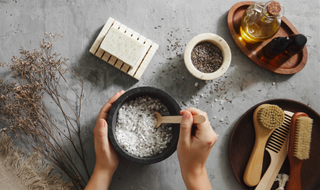
Start up costs: ££ | Start up kit: Skincare ingredients, pots and a spatula | Indoor or outdoor: Indoor | Group activity: No | Skill level: Medium
Reasons for:
- Relaxing and mindful
- Will save you money
- Empowering
Reasons against:
- Time consuming
- Can take a while to master
As well as learning how to do an at-home facial and at-home pedicure, why not make your own skincare range that's completely tailored to your skin, for the ultimate DIY pamper session? While it may sound intimidating to mix up skin products at home, if you opt for natural ingredients, you can still create powerful and potent serums and creams, without dabbling with chemical ingredients like retinol and acids (leave that to the experts!) This is also one of the hobbies to do at home that could save you money.
"Making your own skincare, otherwise known as formulation, is one of the most fun, easy and empowering skills you can learn. After all, you can grow your own food, you can make your own clothes, why shouldn’t you formulate your own skincare? The reality is that you can become a formulator in your own home with just a few ingredients and tools," Lorraine Dallmeier, a biologist and CEO of online formulation school Formula Botanica. "Formulation is a skill that everyone can learn and that allows us to return to our grassroots by reclaiming the knowledge that our ancestors had. And not only is formulation fun, easy and empowering, but it also gives you control over what you put on your body." We've got an extensive guide to how to make your own DIY eye cream to get you started.
21. Reap the benefits of face yoga

Start up costs: £ | Start up kit: Facial oil and tutorials | Indoor or outdoor: Indoor | Group activity: No | Skill level: Medium
Reasons for
- Boosts skin health
- Relaxing and restorative
- Doesn't take up too much time
Reasons against
- Can take some time and dedicating to find the right movements
- Requires discipline as consistency is key
Facial massage is not only a way to relax after a long day and help you unwind and ultimately sleep better - it's also a natural way to improve your skin and strengthen the facial muscles. Massage in general is a great skill to learn and a popular hobby for many with an interest in beauty treatments, however learning the ins and outs of body massage can be an expensive hobby if you embark on a course.
Mastering facial massage is a more manageable goal and something that you can do at home by dedicating just 10 minutes each evening (or even once or twice a week if you're feeling time-poor) with the help of apps like Luminous, which will tailor a face yoga plan that's personalised to your needs. "Just a few minutes spent working across a tight jawline will not only have aesthetic benefits but also an extremely calming effect, especially to anyone prone to stress-induced clenching," explains Ada Ooi, celebrity facialist and founder of 001 Skincare. "One of the best skincare hacks that you can do easily from home is to use face yoga and massage techniques to stimulate acupressure points for tension release and drain the lymphatic system to give a firmer, brighter complexion."
So how often should you do it? Luminous suggests, 'Try to do about 10 minutes of Face Yoga six days a week – consistency is key for achieving the best results; however, we understand this isn’t always possible so do what you can – the results will just take longer.' Membership costs £9 per month, but if you don't want to invest any money at all there are plenty of free routines available online - all you will need is a high-quality facial oil to get going. You could also invest in one of the best gua sha tools or a facial roller to use alongside the techniques.
Lauren is the former Deputy Digital Editor at woman&home and became a journalist mainly because she enjoys being nosy. With a background in features journalism, Lauren worked on the woman&home brand for four years before going freelance. Before woman&home Lauren worked across a variety of women's lifestyle titles, including GoodTo, Woman's Own, and Woman magazine.
-
 The White Company's Hypoallergenic Mattress Topper is surprisingly affordable and a dream to sleep on
The White Company's Hypoallergenic Mattress Topper is surprisingly affordable and a dream to sleep onThe The White Company Hypoallergenic Comfort Topper offers a gentle, supportive layer to your sleep set-up for a surprisingly affordable price.
By Laura Honey Published
-
 Gwyneth Paltrow’s classic pinstripe pyjamas will keep you cool and comfortable on warm nights
Gwyneth Paltrow’s classic pinstripe pyjamas will keep you cool and comfortable on warm nightsChic and comfortable? Her stylish pyjama set is our new go-to
By Charlie Elizabeth Culverhouse Published

